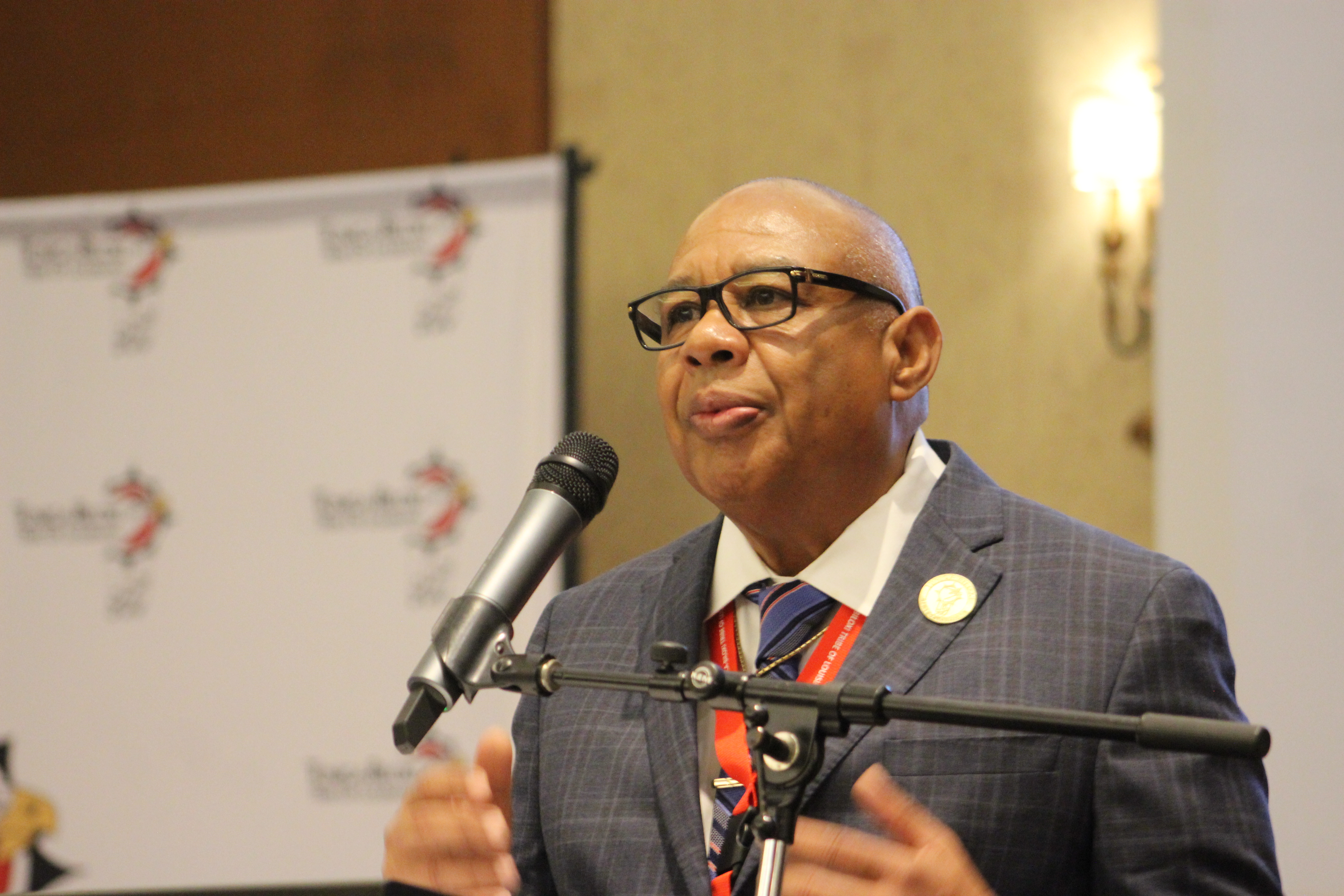
- Details
- By Levi Rickert
MARKSVILLE, La. — Tunica-Biloxi Chairman Marshall Pierite wants to see Indian Country play a role in future economic development over the next four years, with opportunities being presented by the Trump administration.
Last Friday, at the Tunica-Biloxi Tribe’s Paragon Casino Resort, the tribe hosted a roundtable discussion as a means to develop working relationships with members of the Trump administration. The roundtable included tribal leaders, Trump administration officials, and corporate leaders. Also, in attendance was President's Donald Trump's longest serving political advisor Roger Stone.
Among the tribal leaders were Principal Chief Lora Ann Chaisson of the United Houma Nation; Chairman John Lowery of the Lumbee Tribe of North Carolina; Governor Thomas Moquino Jr. of Santo Domingo Pueblo; Chairman Jack Potter Jr. of the Redding Rancheria; and Sherry Treppa, former Chairperson of the Habematolel Pomo of Upper Lake and current president of Habemco.
In all, some 30 tribal leaders were officially present, according to the Tunica-Biloxi Tribe.
Pierite hopes to accomplish his vision through the establishment of a coalition between tribal leaders and members of the Trump administration, working together to promote economic development throughout Indian Country.
Under Pierite’s leadership, the Tunica-Biloxi Tribe’s economic arm, Tunica-Biloxi Industries, is developing a textile manufacturing company that specializes in high-quality textile products for the commercial, government, and hospitality sectors.
“We have to turn our ideas and obstacles into opportunities. These opportunities will allow us to shift the balance of power, to transform concern into conviction, and to take what is meant to stop us—and catapult us into the next destination,” Pierite said.
“I believe President Trump’s vision during this administration emphasizes strong economic growth, deregulation, and the revitalization of communities that have long been forgotten. That vision resonates with many of us because tribal communities have known what it feels like to be overlooked. We are no longer asking for a seat at the table—we are taking our place at the table,” Pierite added.
Also speaking at the roundtable was Diane Cullo, assistant administrator for the Office of Native American Affairs at the U.S. Small Business Administration (SBA). Cullo provided an overview of the Trump administration’s goal of helping more Native American small businesses succeed.
Cullo acknowledged concerns about the future of the SBA’s Tribal 8(a) program, noting that it is currently being analyzed for efficiency and effectiveness.
Earlier in the day, the tribe provided a guided tour of Tunica-Biloxi tribal lands.

In attendance at both roundtable discussions was Roger Stone, a consultant and lobbyist. He told attendees that President Trump supports tribal sovereignty and is eager to work with tribes on economic development projects.
Pierite announced that he will host another roundtable in Washington, D.C., in late July. He indicated that House Speaker Mike Johnson (R-LA) and Senate Majority Leader John Thune (R-SD) are expected to attend.
More Stories Like This
Native News Weekly (August 25, 2024): D.C. BriefsUS Presidents in Their Own Words Concerning American Indians
Indigenous Actor Elaine Miles Reports Detention by Alleged ICE Agents
Happy Thanksgiving from Native News Online
Coming Up on Native Bidaské: Behind the Animation: Joey Clift Talks “Pow” and Native Storytelling
Help us tell the stories that could save Native languages and food traditions
At a critical moment for Indian Country, Native News Online is embarking on our most ambitious reporting project yet: "Cultivating Culture," a three-year investigation into two forces shaping Native community survival—food sovereignty and language revitalization.
The devastating impact of COVID-19 accelerated the loss of Native elders and with them, irreplaceable cultural knowledge. Yet across tribal communities, innovative leaders are fighting back, reclaiming traditional food systems and breathing new life into Native languages. These aren't just cultural preservation efforts—they're powerful pathways to community health, healing, and resilience.
Our dedicated reporting team will spend three years documenting these stories through on-the-ground reporting in 18 tribal communities, producing over 200 in-depth stories, 18 podcast episodes, and multimedia content that amplifies Indigenous voices. We'll show policymakers, funders, and allies how cultural restoration directly impacts physical and mental wellness while celebrating successful models of sovereignty and self-determination.
This isn't corporate media parachuting into Indian Country for a quick story. This is sustained, relationship-based journalism by Native reporters who understand these communities. It's "Warrior Journalism"—fearless reporting that serves the 5.5 million readers who depend on us for news that mainstream media often ignores.
We need your help right now. While we've secured partial funding, we're still $450,000 short of our three-year budget. Our immediate goal is $25,000 this month to keep this critical work moving forward—funding reporter salaries, travel to remote communities, photography, and the deep reporting these stories deserve.
Every dollar directly supports Indigenous journalists telling Indigenous stories. Whether it's $5 or $50, your contribution ensures these vital narratives of resilience, innovation, and hope don't disappear into silence.
 The stakes couldn't be higher. Native languages are being lost at an alarming rate. Food insecurity plagues many tribal communities. But solutions are emerging, and these stories need to be told.
The stakes couldn't be higher. Native languages are being lost at an alarming rate. Food insecurity plagues many tribal communities. But solutions are emerging, and these stories need to be told.
Support independent Native journalism. Fund the stories that matter.
Levi Rickert (Potawatomi), Editor & Publisher

